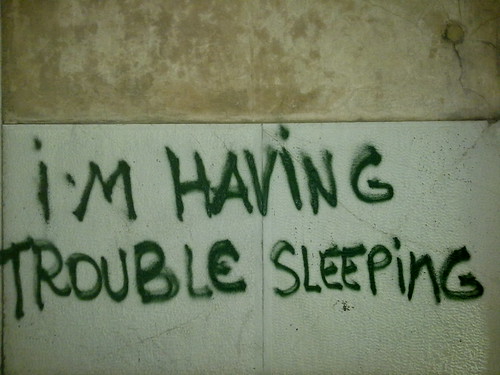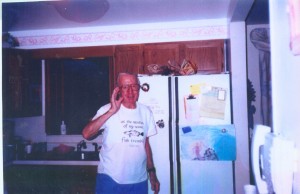 Psychology
Psychology  1 Comment
1 Comment Vignette: Lost in the Shuffle
To go along with the series of posts I’ve been writing about my recent mental health hospitalization, I’m adding a few short scenes from life on the ward. Hopefully, they’re a good complement to the more traditional posts.
 “What are the pink ones?” I ask the nurse as he hands me my morning meds in a tiny paper cup.
“What are the pink ones?” I ask the nurse as he hands me my morning meds in a tiny paper cup.
“The same as yesterday: your allergy pills,” he answers, his attention on something else.
“Huh,” I reply. “I haven’t had my allergy meds since I came in here. Maybe it’ll help with this stuffiness.”
“No,” he says slowly, like he were teaching a child. “You had those yesterday.”
I frown. “No, no I didn’t.”
He sighs and reiterates, “Yes, you did get them yesterday. 30-30-30, which makes 90 milligrams, remember?”
“No,” I answer flatly. “I’m very sure I didn’t. There was no pink in my cup yesterday morning. I remember.”
His bedside manner dies a quick, cold death in the face of my resistance. His mouth tightens into a flat line for a moment before he says, “Well, I guess we’ll have to agree to have different memories, because I know I had the same conversation with you yesterday.”
“No, I didn’t!” I exclaimed. “I might be wrong about the pills; I don’t think I am, but maybe. But I’d definitely remember this conversation. This is not a replay.”
He looked at me sadly, as if my disagreement disappointed him gravely. I didn’t think you’d be the type to argue, his expression said. “I’m sorry you don’t remember,” he said.
“I remember fine,” I snapped. “I’ve got a photographic memory. I remember the cup, I remember the pills, I remember the blue and green pattern on your damn shirt. I did not get anything pink yesterday.”
He walked away, ducking his head as if to stave off any further argument. I sat back in my chair, winded with exasperation, and then it struck me like a fast car:
This is how it starts. Now I’m the lady arguing about pills in the psych ward.
I’m the one whose memory has holes in it like depression had walked through the spiderweb of my days, tearing whole sections out. This tool I rely on so heavily—these millions of flashbulb pictures I layer, sort, and store all day, every day—it’s unthinkable that it would fail me.
I can recall the yellow pattern of the wallpaper in my nursery as I lay on my back in my crib. I can recall the precise color of any piece of my clothing so I can match thread to fix a button while I’m out shopping. I can go through our house and say where we got almost every object in it. How can my memory have ejected something so recent, so memorable? What else would it suddenly toss out into the void? How long would it take me to miss it?
Is this how it is for the other people in here, the frequent flyers? When did their memories start to shuffle unexpectedly, like furniture moving itself while you’re out of the house? How many conversations did they forget before they started to doubt the solidity of the ground they were building their lives on? How do they plan a future or react to a crisis if they can’t call up a clear, certain memory of what went before?
I was swamped with confusion, but the beacon that drew me through the fog was empathy for these temporary neighbors, and all the people like them in mental health units and outpatient programs and aching solitude all over the world. In feeling the vertigo of being adrift in the sequences of everyday life, I wanted to rush around, planting signposts, affixing Post-Its to bathroom mirrors, tucking notes in lunchboxes to remind them that there is order and love and understanding out there, even if they can’t remember it.
I sat by the window most of that morning, looking out on the endless Mississippi River flowing by. I thought about how it didn’t need to remember any of the people who’ve traversed it over millennia to follow its inexorable path. I stayed with the terror of losing the reliability of my own memory, and how it might feel to learn to flow without staking out landmarks every inch of the route. It would mean letting go, the hardest thing in the world for me to do.
On my way past the nurses’ station around lunch, I heard a voice call my name. I looked over and saw the morning nurse. He had an odd look on his face, like someone who’s about to do something their parent is making them do.
He cleared his throat and said, “Um, so, funny thing. It turns out I was mixing you up with somebody else who also gets allergy meds. It was her who I talked with yesterday, not you.”
I stood silent, shocked to get this admission from anyone in authority. People in mental health units don’t have to apologize for anything, typically, not even fairly egregious mistakes or omissions.
“So, heh, I guess you didn’t get those meds yesterday. Sorry for the confusion,” he finished, shuffling papers on his clipboard so he wouldn’t have to make eye contact with me.
I nodded and thanked him for the apology, when what I really wanted to do was pump my fists in the air, and hoot, and run a victory lap around the TV lounge. I don’t need to be right all the time. I’d even made a weird sort of peace with being wrong. But I’d be lying if I didn’t say all I felt at that moment was a rush of relief like the one when you finally see a road sign after doubting your direction for miles on end.



 The time for ritual is at hand. I stand in the place of my power, tools of the magic I will work laid out before me– silver, wood, and steel. Fire and water are at my command, earth and air held back by my will. In this time, I will draw on the forces of creation, shaping elements. Here, I am an alchemist, a hand of the goddess herself.
The time for ritual is at hand. I stand in the place of my power, tools of the magic I will work laid out before me– silver, wood, and steel. Fire and water are at my command, earth and air held back by my will. In this time, I will draw on the forces of creation, shaping elements. Here, I am an alchemist, a hand of the goddess herself. While I am not so bold as to commit to such a statement myself, the power of the kitchen, and what it summons and creates, is not to be denied. Though I began down the path of Wicca in solitude, I learned the magic of cooking as all good magics are best learned : at the elbow of a wise and laughing grandmother. The rules were simple. Wash your hands. Clean as you go. Read the whole recipe before you start. Measure with care. And, most importantly, share the joy as often as possible–that’s why there are always enough beaters and spatulas and bowls for everyone. If you abide by that last rule, no spills or scorches can spell failure. Just vacuum up the oatmeal, wash the egg out of your hair, and laugh about the fun you had.
While I am not so bold as to commit to such a statement myself, the power of the kitchen, and what it summons and creates, is not to be denied. Though I began down the path of Wicca in solitude, I learned the magic of cooking as all good magics are best learned : at the elbow of a wise and laughing grandmother. The rules were simple. Wash your hands. Clean as you go. Read the whole recipe before you start. Measure with care. And, most importantly, share the joy as often as possible–that’s why there are always enough beaters and spatulas and bowls for everyone. If you abide by that last rule, no spills or scorches can spell failure. Just vacuum up the oatmeal, wash the egg out of your hair, and laugh about the fun you had. But I have to be honest about something, and it’ll probably blow the lid right off any sort of “kitchen witch mystique” I may have managed to build. I am no gourmet. I’ve never taken a cooking class. Those brownies which my friends and co-workers steadfastly maintain are the best they’ve ever tasted? Betty Crocker, Fudge Supreme, $2.49 with coupon. That chili whose aroma wafts out like tickling fingers when I open the door on a cold winter night, drawing my husband in all the quicker? Packet of spices, canned beans and tomatoes. Simmer on low for 20 minutes. That’s it. And I’ve never made a secret of it.
But I have to be honest about something, and it’ll probably blow the lid right off any sort of “kitchen witch mystique” I may have managed to build. I am no gourmet. I’ve never taken a cooking class. Those brownies which my friends and co-workers steadfastly maintain are the best they’ve ever tasted? Betty Crocker, Fudge Supreme, $2.49 with coupon. That chili whose aroma wafts out like tickling fingers when I open the door on a cold winter night, drawing my husband in all the quicker? Packet of spices, canned beans and tomatoes. Simmer on low for 20 minutes. That’s it. And I’ve never made a secret of it. So I may not always remember all the poetic invocations when I call the Watchtowers in a Circle, but I remember the favourite food for every loved one in my life, and most of the recipes. And so I might be dreadful at keeping a proper herbal grimoire stocked–my spice racks are the envy of all who survey. I consider myself well on the road to the Lord and Lady’s wisdom, because I know the seat and value of a generous, abundant power within myself, one of the greatest signposts on everyone’s spiritual journey. And when I get there, I’ll be sure to have a dish to pass.
So I may not always remember all the poetic invocations when I call the Watchtowers in a Circle, but I remember the favourite food for every loved one in my life, and most of the recipes. And so I might be dreadful at keeping a proper herbal grimoire stocked–my spice racks are the envy of all who survey. I consider myself well on the road to the Lord and Lady’s wisdom, because I know the seat and value of a generous, abundant power within myself, one of the greatest signposts on everyone’s spiritual journey. And when I get there, I’ll be sure to have a dish to pass.
 Nightmares, though…nightmares are something else entirely. Sure, I had bad dreams when I was a kid. My grandparents took me with them to see
Nightmares, though…nightmares are something else entirely. Sure, I had bad dreams when I was a kid. My grandparents took me with them to see 




 Reverb Broads 2011, December 29: What was the soundtrack of your year? Of your life? Which songs most strongly represent the various eras of your life? What songs were playing for the most crucial, formative moments of your life? Or, if the chronological approach doesn’t work for you, which songs best capture the different facets of your life? (Childhood, Love Life, Adulthood, Loss, Growth, Career, Happiness, Sadness, etc.) Please elaborate. (courtesy of Bethany/Katie)
Reverb Broads 2011, December 29: What was the soundtrack of your year? Of your life? Which songs most strongly represent the various eras of your life? What songs were playing for the most crucial, formative moments of your life? Or, if the chronological approach doesn’t work for you, which songs best capture the different facets of your life? (Childhood, Love Life, Adulthood, Loss, Growth, Career, Happiness, Sadness, etc.) Please elaborate. (courtesy of Bethany/Katie)